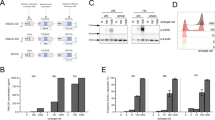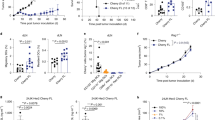Abstract.
Cytotoxic T cells can recognize and kill tumor cells that present peptides derived from tumor-associated antigens (TAA) on their surface when associated with major histocompatibility complex (MHC) class I molecules. However, immune responses to tumor-associated antigens are often suppressed by a tumor-induced state of immune anergy. Previous work has attempted to overcome tumor-induced T cell anergy by the direct injection of vectors carrying genes encoding one of a variety of cytokines. Polyclonal stimulation of T cells, preferably via the TCR complex, results in a cascade of cytokines associated with T cell activation and thus may be better able to overcome T cell anergy. We have previously reported the use of the highly attenuated MVA poxvirus to express on tumor cells, in vitro and in vivo, antibodies specific for the CD3ε chain (KT3). When injected into growing tumors, these constructs induce the activation of immune effector cells and result in rejection of the tumor. A variety of recombinant adenovirus (Ad) vectors expressing immunostimulatory and/or immunoattractant molecules have now been produced. With this collection of viruses, we have carried out in vivo analyses of combinations of vectors in tumor therapy experiments. For example, we have tested, in murine tumor models, the combination of MVA-KT3 with Ad expressing recently identified cytokines [for example interleukin-12 (IL-12), IL-18] as well as chemokines (e.g. RANTES, MIP1β). One combination, MVA-KT3/Ad-IL-12/Ad-MIP1β causes rejection of 100% of growing RENCA tumors. Much attention has been focused on cancer gene therapy using gene transfer of single agents. These data show that antigenic stimulation via the MHCI/TCR-CD3+cytokine+chemokine combination may provide a new and promising approach to cancer gene therapy which is more likely to bypass tumor immunosuppression mechanisms.
Similar content being viewed by others
Author information
Authors and Affiliations
Additional information
Electronic Publication
Rights and permissions
About this article
Cite this article
Paul, S., Regulier, E., Poitevin, Y. et al. The combination of a chemokine, cytokine and TCR-based T cell stimulus for effective gene therapy of cancer. Cancer Immunol Immunother 51, 645–654 (2002). https://doi.org/10.1007/s00262-002-0314-2
Received:
Accepted:
Issue Date:
DOI: https://doi.org/10.1007/s00262-002-0314-2




